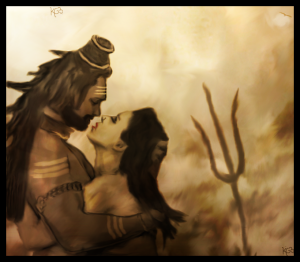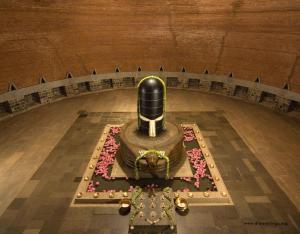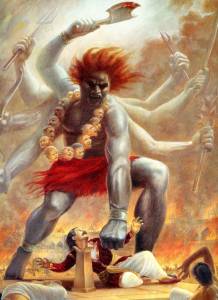There is a mountain celebrated under the name of Himavat, haunted by Kinnaras, Gandharvas, and Vidyádharas, a very monarch of mighty hills; the northernmost summit thereof is a great peak named Kailása, which towers many thousand miles in the air, There dwells Maheśvara the beloved husband of Párvatí, the chief of things animate and inanimate, attended upon by his army (Gaṇas), Vidyádharas and Siddhas. Once on a time that lord, the husband of Párvatí, was gratified with praises by his wife, having gained confidence as she sat in secret with him; The Lord, attentive to her praise and delighted, placed her on his lap, and said, “What can I do to please thee?” Then the daughter of the mountain spoke—“My lord, if thou art satisfied with me, then tell me some delightful story that is quite new.” And Śiva said to her, “What can there be in the world, my beloved, present, past, or future that thou dost not know?” Then that goddess, beloved of Śiva, importuned him eagerly because she was proud in soul on account of his affection.
“Once upon a time Lord Brahmá (creator of worlds) and Lord Vishnu (Preserver of worlds) roaming through the world in order to behold me, came to the foot of Himavat. There they saw a great flame-linga in order to discover the end of it, one of them went up, and the other down; and when they could not find the end of it, they proceeded to propitiate me by means of austerities: and I appeared to them and bade them to ask for some boon: hearing that Brahmá asked me to become his son; on that account he has ceased to be worthy of worship, disgraced by his overweening presumption.
“Then that god Lord Vishnu craved a boon of me, saying—Oh revered one, may I become devoted to your service! Then he became incarnate, and was born as mine in your form; for you are the same as Lord Vishnu, the power of me all-powerful.
“Moreover you were my wife in a former birth.” When Śiva had thus spoken, Párvatí asked, “How can I have been your wife in a former birth?” Then Śiva answered her. “Long ago to the King Daksha were born many daughters, and amongst them you, Oh goddess! He gave you in marriage to me, and the others to the rest of the gods. Once up on a time he invited all his sons-in-law to a sacrifice. But I alone was not included in the invitation; thereupon in anger you asked him to tell the reason why her husband was not invited. Then he uttered a speech which pierced your ears like a poisoned needle; ‘Your husband wears a necklace of skulls; how can he be invited to a auspicious sacrifice?’
“And then you, my beloved, in anger sacrificed and abandoned your body, exclaiming,—‘This father of mine is a villain; what profit have I then in this carcass sprung from him?’
“And thereupon in wrath I destroyed that sacrifice of King Daksha.
After that you were born again as the daughter of the mount of snow (The Himalaya). Then recall how I came to the Himálaya in order to perform austerities; and your father ordered you to do me service as his guest: and there smitten by the arrow of the love god send by the gods so that they might obtain from me a son to oppose the demon Táraka. Then I was purchased by you, the enduring one, with severe austerities, and I accepted your proposal, my beloved, in order that I might add this merit to my stock. Thus it is clear that you were my wife in a former birth. What else shall I tell you?”
Thus Śiva spoke, and when he had ceased, the goddess responded with wrath, she exclaimed,—“You are a deceiver; you will not tell me a pleasing tale even though I ask you: Do I not know that?” Hearing that, Śiva proceeded to conciliate her and promised to tell her a wonderful tale: then she dismissed her anger. She herself gave the order that no one was to enter where they were; Nandin (one of the ganas) thereupon kept the door, and Śiva began to speak.
“The gods are supremely blessed, men are ever miserable, the actions of demigods are exceedingly charming, therefore I now proceed to relate to you the history of the Vidyádharas.” While Śiva was thus speaking to his consort, there arrived a favourite dependant of Śiva’s, Pushpadanta, best of Gaṇas, and his entrance was forbidden by Nandin who was guarding the door. Curious to know why even he had been forbidden to enter at that time without any apparent reason, making use of his magic power attained by devotion, Pushpadanta immediately entered the room ivisible to prevent his being seen, and when he had thus entered, he heard all the extraordinary and wonderful adventures of the seven Vidyádharas being narrated by the trident-bearing god, and having heard them he in turn went and narrated them to his wife Jayá; for who can hide wealth or a secret from women? Jayá the doorkeeper being filled with wonder went and recited it in the presence of Párvatí. How can women be expected to restrain their speech and keep secrets? And then the daughter of the mountain flew into a passion, and said to her husband, “You didn’t tell me any extraordinary tale, for Jayá knows it also.” Then the lord, perceiving the truth by profound meditation, thus spoke: “Pushpadanta employing the magic power of devotion entered in where we were, and thus managed to hear it. He narrated it to Jayá; no one else knows it, my beloved.”
Having heard this, the goddess exceedingly enraged caused Pushpadanta to be summoned, and cursed him, as he stood trembling before her, saying,
“Become a mortal you disobedient servant.”
She also cursed the Gaṇa Mályaván who presumed to intercede on his behalf of his friend Pushpadanta. Then the two fell at her feet together with Jayá and entreated her to say when the curse would be lifted, and the wife of Śiva slowly uttered this speech—
“A Yaksha named Supratíka who has been made a demon by a curse is residing in the Vindhya forest under the name of Káṇabhúti. When you shall see him and, calling to mind your origin, tell him this tale, then, Pushpadanta, you shall be released from this curse. And when Mályaván shall hear this tale from Káṇabhúti, then Káṇabhúti shall be released, and you, Mályaván, when you have published it abroad, you shall be freed also.” Having thus spoken the daughter of the mountain ceased, and immediately those Gaṇas disappeared instantaneously like flashes of lightning.
Then it came to pass in the course of time that Parvati full of pity asked Śiva, “My lord, where on the earth have those excellent Ganas whom I cursed, been born?” And the Lord answered: “My beloved, Pushpadanta has been born under the name of Vararuchi in that great city which is called Kauśámbí. Moreover Mályaván also has been born in the splendid city called Supratishṭhita under the name of Guṇáḍhya. This, O goddess, is what has befallen them.” Having given her this information with grief caused by recalling to mind the degradation of the servants that had always been obedient to him, that lord continued to dwell with his beloved in pleasure-arbours on the slopes of mount Kailása.
continued here- Chapter II The Incarnation of Pushpadanta as a man



One thought on “Book 1 Story Summary, Chapter I”